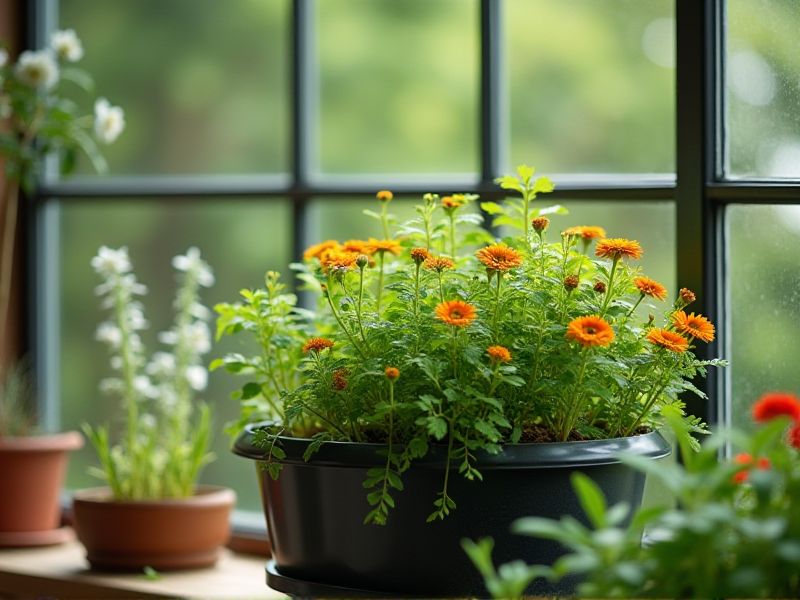
When selecting container plants for your balcony, consider options that thrive in limited space and varying sunlight conditions. Dwarf varieties of shrubs, such as boxwood or lavender, provide aesthetic appeal while requiring minimal maintenance. Colorful flowers like petunias or geraniums add vibrancy and can bloom throughout the season, enhancing your outdoor space. For a more sustainable choice, herbs like basil, mint, or rosemary can be grown easily in pots, offering fresh ingredients for your kitchen. Additionally, vertical gardening techniques can maximize space, allowing you to enjoy a lush green environment in urban settings.
List of some Container plants that suit balconies
- Spider Plant (Chlorophytum comosum)
- Jade Plant (Crassula ovata)
- Snake Plant (Sansevieria trifasciata)
- Pothos (Epipremnum aureum)
- Geranium (Pelargonium spp.)
- Lavender (Lavandula spp.)
- Fuchsia (Fuchsia spp.)
- Marigold (Tagetes spp.)
- Peace Lily (Spathiphyllum spp.)
- Coleus (Plectranthus scutellarioides)
Important things about Container plants that suit balconies
Size Of Containers
Choosing the right size of containers is crucial for balcony gardening, as it affects both plant health and aesthetics. For most balcony plants, a pot with a diameter of 12 to 16 inches is ideal, providing adequate space for root development while ensuring easy handling. Utilizing lightweight materials such as fiberglass or resin can alleviate weight concerns, making it easier to move your plants around to optimize sunlight exposure. Don't forget to incorporate drainage holes to prevent waterlogging, promoting healthier growth for your balcony garden.
Drainage Requirements
When selecting container plants for your balcony, understanding drainage requirements is crucial for their health and vitality. Ensure that your containers have adequate drainage holes to prevent waterlogging, which can lead to root rot. You might consider using potting mixes designed for container gardening, as they often contain components like perlite or vermiculite that enhance drainage. Incorporating a layer of gravel or broken pottery at the bottom of your pots can further improve drainage and promote healthy plant growth.
Plant Compatibility
When selecting container plants for your balcony, consider the varying sunlight and wind exposure specific to your space. Herbs like basil and rosemary thrive in sunny locations, while ferns and shade-loving plants such as hostas can flourish in less bright areas. Ensure you choose the right pot size and drainage to prevent root rot, as proper water management is crucial for container gardening. You can create visual interest and biodiversity by mixing flowering plants, like petunias, with lush greenery, enhancing both aesthetics and the environment in your urban oasis.
Sunlight Exposure
Container plants that thrive on balconies greatly benefit from specific sunlight exposure. For optimal growth, select plants like petunias, geraniums, and succulents, which flourish in full sun, requiring at least six hours of direct sunlight daily. If your balcony receives partial shade, consider ferns and impatiens, which adapt well to softer light conditions. Monitoring sun patterns on your balcony will help you position your containers for the best light, ensuring vibrant and lush plants throughout the growing season.
Soil Type And Quality
Choosing the right soil type is crucial for container plants thriving on your balcony. Opt for a lightweight potting mix designed for container gardening, often labeled as "soilless" mix, which promotes good drainage and aeration. Incorporating organic compost into your potting mix enriches the soil with essential nutrients, benefiting plants such as petunias, herbs, and dwarf varieties of vegetables. Regularly check and maintain the pH level of the soil, ideally between 6.0 and 7.0, to ensure your balcony plants remain healthy and vibrant.
Watering Frequency
Container plants thriving on balconies require careful attention to watering frequency, as their limited soil volume can dry out quickly. Typically, you should check the soil moisture every few days, depending on the plant type and local climate conditions. For instance, drought-tolerant plants like succulents may only need watering once a week, while flowering containers might require daily or every-other-day hydration during hot spells. You can enhance plant health by ensuring proper drainage at the bottom of containers, preventing root rot while encouraging robust growth.
Fertilization Needs
Container plants for balconies thrive best with proper fertilization, as they often have limited soil volume and nutrients. Choose slow-release fertilizers formulated for container gardening to ensure a steady supply of essential nutrients like nitrogen, phosphorus, and potassium. Regularly monitor your plants for signs of nutrient deficiency, such as yellowing leaves or stunted growth, to adjust your fertilization schedule accordingly. Incorporating organic options, like compost or worm castings, can enhance soil fertility while promoting a sustainable gardening environment.
Seasonal Adaptations
Container plants like petunias and geraniums thrive on balconies, bringing vibrant color and seasonal beauty. For spring, consider planting pansies and snapdragons, which can withstand cooler temperatures and add cheerful hues. In summer, heat-tolerant options such as succulents and marigolds are ideal, requiring minimal watering and ensuring low maintenance. As fall approaches, ornamental kale and chrysanthemums provide stunning foliage and blooms, perfect for creating a seasonal display.
Wind Protection Strategies
To ensure healthy growth of container plants on your balcony, implementing effective wind protection strategies is essential. Using windbreaks like tall planters or outdoor screens can shield delicate plants from harsh gusts. Additionally, placing your pots close to walls or using wind-resistant plant varieties, such as dwarf shrubs or ornamental grasses, can help create a more stable microclimate. Regularly monitoring your balcony's wind patterns allows you to adjust your arrangements, ensuring your container garden thrives even in breezy conditions.
Pest Management Techniques
When selecting container plants for balconies, consider varieties that are resilient to pests and diseases. Herbs like basil, mint, and rosemary are not only culinary delights but also natural pest deterrents. Flowering plants such as marigolds and nasturtiums can enhance your balcony's visuals while attracting beneficial insects that control harmful pests. Regular monitoring and using organic pest management strategies like neem oil can ensure your container garden thrives in an urban environment.
